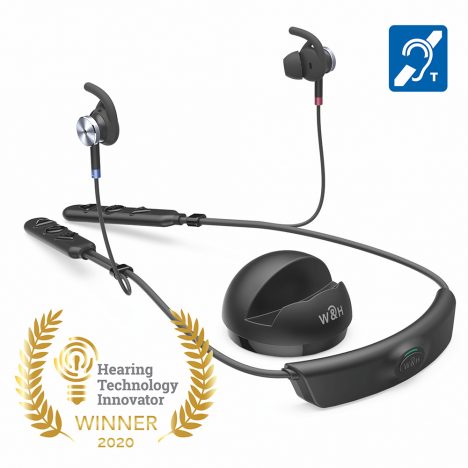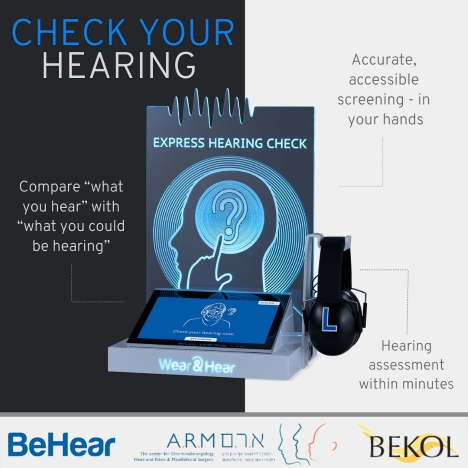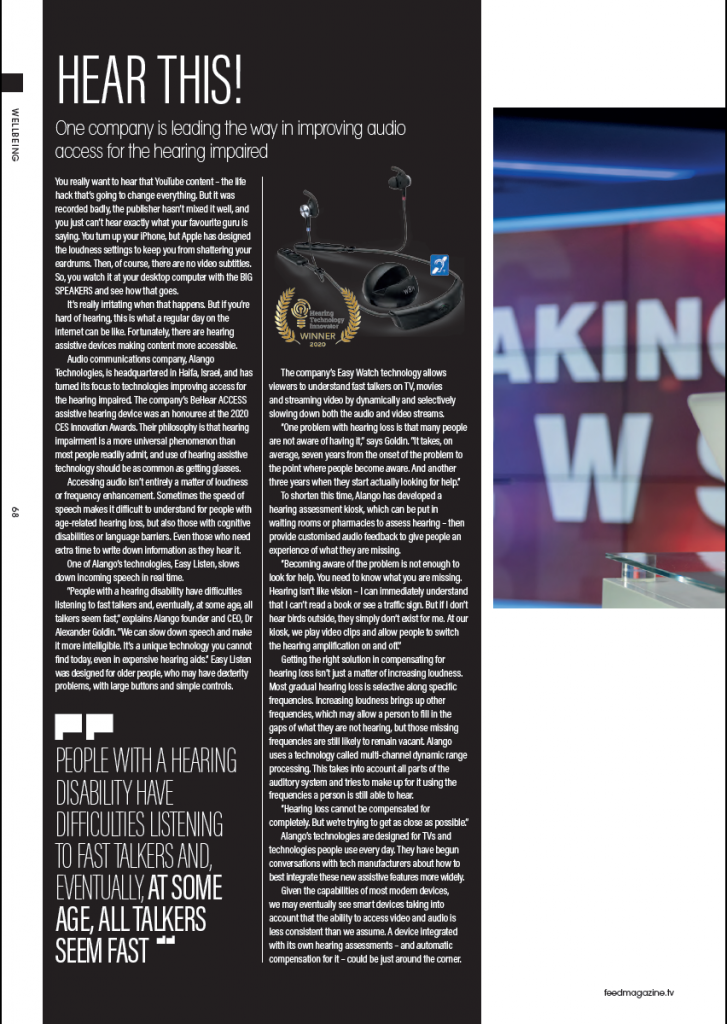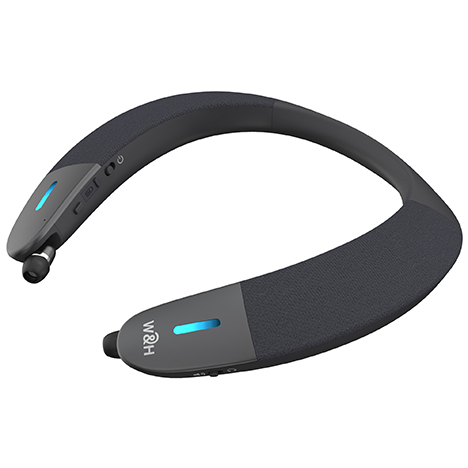HEAR THIS! One company is leading the way in improving audio access for the hearing impaired
[Originally published in FeedMagazine.tv – Spring 2021]
You really want to hear that YouTube content – the life hack that’s going to change everything. But it was recorded badly, the publisher hasn’t mixed it well, and you just can’t hear exactly what your favourite guru is saying. You turn up your iPhone, but Apple has designed the loudness settings to keep you from shattering your eardrums. Then, of course, there are no video subtitles. So, you watch it at your desktop computer with the BIG SPEAKERS and see how that goes.
It’s really irritating when that happens. But if you’re hard of hearing, this is what a regular day on the internet can be like. Fortunately, there are hearing assistive devices making content more accessible.

Audio communications company, Alango Technologies, is headquartered in Haifa, Israel, and has turned its focus to technologies improving access for the hearing impaired. The company’s BeHear ACCESS assistive hearing device was an honouree at the 2020 CES Innovation Awards. Their philosophy is that hearing impairment is a more universal phenomenon than most people readily admit, and use of hearing assistive technology should be as common as getting glasses.
Accessing audio isn’t entirely a matter of loudness or frequency enhancement. Sometimes the speed of speech makes it difficult to understand for people with age-related hearing loss, but also those with cognitive disabilities or language barriers. Even those who need extra time to write down information as they hear it.
One of Alango’s technologies, EasyListen, slows down incoming speech in real time.
“People with a hearing disability have difficulties listening to fast talkers and, eventually, at some age, all talkers seem fast,” explains Alango founder and CEO, Dr Alexander Goldin. “We can slow down speech and make it more intelligible. It’s a unique technology you cannot find today, even in expensive hearing aids.” BeHear ACCESS was designed for older people, who may have dexterity problems, with large buttons and simple controls.
The company’s EasyWatch technology allows viewers to understand fast talkers on TV, movies and streaming video by dynamically and selectively slowing down both the audio and video streams.
“One problem with hearing loss is that many people are not aware of having it,” says Goldin. “It takes, on average, seven years from the onset of the problem to the point where people become aware. And another three years when they start actually looking for help.”
To shorten this time, Alango has developed a hearing assessment kiosk, which can be put in waiting rooms or pharmacies to assess hearing – then provide customised audio feedback to give people an experience of what they are missing.
“Becoming aware of the problem is not enough to look for help. You need to know what you are missing. Hearing isn’t like vision – I can immediately understand that I can’t read a book or see a traffic sign. But if I don’t hear birds outside, they simply don’t exist for me. At our kiosk, we play video clips and allow people to switch the hearing amplification on and off.”
Getting the right solution in compensating for hearing loss isn’t just a matter of increasing loudness. Most gradual hearing loss is selective along specific frequencies. Increasing loudness brings up other frequencies, which may allow a person to fill in the gaps of what they are not hearing, but those missing frequencies are still likely to remain vacant. Alango uses a technology called multi-channel dynamic range processing. This takes into account all parts of the auditory system and tries to make up for it using the frequencies a person is still able to hear.
“Hearing loss cannot be compensated for completely. But we’re trying to get as close as possible.”
Alango’s technologies are designed for TVs and technologies people use every day. They have begun conversations with tech manufacturers about how to best integrate these new assistive features more widely.
Given the capabilities of most modern devices, we may eventually see smart devices taking into account that the ability to access video and audio is less consistent than we assume. A device integrated with its own hearing assessments – and automatic compensation for it – could be just around the corner.
PEOPLE WITH A HEARING DISABILITY HAVE DIFFICULTIES LISTENING TO FAST TALKERS AND, EVENTUALLY, AT SOME AGE, ALL TALKERS SEEM FAST
View the original article at https://online.bright-publishing.com/view/528237499/68/
3 ways to avoid using our products
Our goal is to democratize hearing and help make everyone’s life sound better. That’s why we make cutting edge hearing technology accessible to everyone who needs it. BUT, since prevention is the best cure, we’ve decided to share 3 easy hearing tips that will help protect you and the people you love from hearing loss in the future:
Hearing tip № 1
Love to spend time at restaurants and bars with loud music? How about rock concerts? Prepare to be our customer! The outbreak of Covid19 made it difficult to do many of the things we most enjoy. The good news is that, as vaccinations become more prevalent and quarantines are opened, we are going back to our old routines. The bad news is that loud music creates a dangerous level of sound which damages your ears.
Avoid being close to loudspeakers, especially for extended periods of time. Prepare in advance and use earplugs or give your ears a rest by going outside from time to time.
Hearing tip № 2
Working in a loud place without hearing protection? Welcome to our club!
Many people are exposed the sounds generated by machinery during their working hours. That means extended exposure, day after day, for years. Hearing loss occurs slowly, over time and so, for example, a construction worker might not notice there is a problem until it is too late. This is a case of better safe than sorry! Your employer should supply you with ear protection in the form of noise cancelling headphones, or at least earplugs. If they don’t, it’s worth purchasing your own earplugs. The expense is small but the benefit in avoiding accumulative damage is large.
Hearing tip № 3
Are you a parent to a teenager? It’s important to check whether or not they are blasting their eardrums, paving the way to a future of hearing loss.
Teenagers commonly prefer listening to music at the highest possible volume to lose themselves in the beat. If you can hear the music “spilling out” of their room or headset, it is too loud – but that also means you are in luck! It’s highly probable that your teenager is blasting his or her ears via their headphones and, unless you actively check, you will never know. Be active in teaching hearing health awareness. Your kids might think you are annoying now (they will for a million other things anyway), but they will thank you in the future.
Whenever possible, it is best to prevent difficulties, but if you are currently experiencing hearing loss, no worries! Our hearables offer a simple and accessible hearing enhancement solution that make life sound better. There is no reason to miss out on the activities and interactions that you love!
Shattering disability stigma for World Hearing Day with Israeli BeHear technology enabling self-administered hearing screening
A.R.M. and BeKol leverage BeHear’s innovative hearing check kiosks to raise hearing health awareness and accessibility
A special initiative by A.R.M. Medical Center, experts in Otorhinolaryngology, Head and Neck, and Oral and Maxillofacial surgery; BeKol, the organization representing the hard of hearing in Israel; and BeHear by Alango Technologies is designed to shatter disability stigma while promoting hearing health awareness and accessibility.
Imagine a world where disabilities are addressed without stigma. Imagine a world where all people are treated with dignity and respect and can easily implement technological solutions without experiencing shame. While this seems like an obvious and morally imperative goal, when it comes to hearing health there is a painful dissonance between its importance and the general levels of awareness and accessibility. Worst of all, there is a high level of social stigma attached to hearing as a disability, as if it is indicative of being “broken”, old, or damaged, as well as the negative and completely inappropriate association of cognitive incapacity.
World Hearing Day is an annual global initiative sponsored by the World Health Organization (WHO), designed to raise awareness and promote hearing care at community and national levels across the world. This year’s theme “Hearing care for ALL! Screen. Rehabilitate. Communicate.” fits perfectly with the A.R.M.-BeKol-BeHear initiative to provide free, accessible hearing screening.

Using equipment donated by Alango to BeKol, free access will be provided to BeHear’s hearing check kiosks located at the A.R.M. Medical Center in Assuta Hospital, Tel Aviv. The innovative kiosks offer a unique balance of user-independence with precision results, testing in a quick and simple process that anyone can undertake without the help of a healthcare professional. The system guides the user through a 5-minute hearing assessment using an intuitive interface available in English, Hebrew, Russian, and Arabic. Results are received on the spot and can be sent to the user’s email. The user is then invited to compare “what they hear” with “what they could be hearing” once BeHear’s advanced hearing enhancement technology is applied to the sound they hear.
“Increasing visibility raises acceptance and reduces social stigma.” states Dr. Alexander Goldin, Founder and CEO of Alango Technologies. “There is no excuse for people to be deterred from attaining the hearing care they need due to complicated bureaucracy, fear of going for screening, or high costs. We hope that through the donation of our kiosks to Bekol and the screenings that will take place, many people will be empowered to take control of their hearing health and address any issues they might have sooner, rather than later. People tend to like playing with gadgets so many will find that our hearing assessment is actually an interesting and engaging experience.”
“We at A.R.M. Medical Center work hard to raise awareness about the importance of early diagnosis of hearing loss and the need for appropriate and customized treatment,” states Prof. Michal Lunz, Director of the Department of Ear Surgery and Hearing Rehabilitation, A.R.M. “Each year, in conjunction with World Hearing Day, we hold a special week-long event. We invite the public to come and get tested by A.R.M.’s team of experts and receive the best diagnosis and consulting, all at no cost, in order to make good hearing health accessible to everyone.”
BeKol Executive Director Damian Kelman explains, “Bekol constantly strives to raise awareness and increase accessibility to good hearing health. World Hearing Day 2021 marks a unique opportunity to enhance Bekol’s efforts to provide free hearing screenings to the general population and to elderly adults in particular. With the newly and highly appreciated addition of BeHear kiosks to our centers and hearing mobile stations, we at Bekol look forward to expanding and maximizing the impact of our screening program throughout the year as well. Increasing testing availability and simplifying the process is a critical part of disrupting the barriers to hearing health.”
Free screenings using the Hearing Check Kiosks will take place over the course of two days (March 8 & March 10). The appointments are conditional on pre-registration by phone: 03-7645464, and will take place at A.R.M. Medical Center located at 20 Habarzel Street, 1st floor, Assuta Hospital, Ramat Hachayal, Tel Aviv. In addition to the hearing screenings, A.R.M. offers at no cost consulting appointments with its team of leading otologists and audiologists.
About A.R.M.
A.R.M Medical Center was founded in 2009 as a center of expertise in the fields of Otorhinolaryngology, Head and Neck, and Oral and Maxillofacial surgery. With its team of leading Israeli doctors, it works to deliver all-encompassing solutions for patient needs, with full consideration of the best available technologies. The A.R.M Medical Center operates within “Assuta”, the most advanced private hospital in Israel. For more information, visit: www.aram-ent.co.il/en
About BeKol
BeKol is the organization representing the hard of hearing in Israel that strives for the empowerment, attainment of equal opportunities, and real integration of the hard of hearing in Israel, in all areas of life. The goal of the BeKol is to ensure that every hard of hearing person in Israel will be able to make the most of their skills, to the extent that their heart desires. For more information, visit: www.bekol.org
About Alango Technologies
Alango Technologies, Ltd. (www.alango.com) has been developing sound enhancement technologies since 2002, selling over 50 million software licenses that improve the audio experience in automotive, entertainment, and smart home applications around the world. Realizing the importance and opportunity of combining the sound enhancement technology found in hearing aids with the advances and costs in the consumer electronics world, the Company is now using its field-proven expertise in sound technology to create products for personal hearing enhancement: the “BeHear” product line (www.WearAndHear.com).
###
BeHear, HearLink, and Wear & Hear are registered trademarks of Alango Technologies, Ltd. in the United States. All other trademarks are the property of their respective holders.
Also published at:
https://finance.yahoo.com/news/shattering-disability-stigma-world-hearing-160200047.html
PROXY Listening Experience Helps Battle Zoom Fatigue
Alango releases BeHear PROXY, a customizable Bluetooth neck speaker and hearing amplifier that provides a comfortable, rich stereo sound experience for TV watching, mobile calls, audio/video streaming, gaming, and live conversations
Alango Technologies announced that a new model called BeHear® PROXY has been added to its line of hearing enhancement solutions.
The COVID-19 pandemic and subsequent preference to shelter at home have driven remote working, virtual communications and TV watching through the roof. It turns out that virtual communication is stressful for the brain and over-use of these platforms can create a type of tiredness, worry, or burnout which has been coined “Zoom fatigue”.
BeHear’s PROXY can help alleviate some of the stress of Zoom fatigue by creating a comfortable, customized, immersive listening experience. Straining to hear and the need to focus almost entirely on vocals (in contrast to an in-person interaction that provides many more visual cues) is a major factor in Zoom fatigue. PROXY connects to the audio source to deliver sound in close proximity (get it?) to the ears, while Alango’s advanced hearing enhancement technology clarifies dialogue and customizes amplification based on the wearer’s unique hearing profile.
PROXY’s ergonomic form factor rests lightly on the shoulders, emitting rich surround sound enhanced by Alango’s technology. This enables the wearer to enjoy high quality sound without having anything in the ears, worrying that earbuds will fall out or getting hot from over-the-ears headphones. Ears-free is a different and cool way to listen but the true beauty in PROXY is the customization capabilities.
Alango’s audio experts designed the product to produce an individualized hearing profile for every user, including those who are hard of hearing. BeHear PROXY can be used with hearing aids, or as a back-up hearing amplifier to relieve hearing aid fatigue. Amplification can be ~20% stronger than that of a mobile phone or computer speaker – but it is applied only where and when needed, according to the user’s hearing profile. Amplification on its own just makes everything louder. The BeHear magic is in custom fitting the sound to each user and supporting their individual hearing needs.
“We developed BeHear PROXY to create a new hearing experience, to make life sound better when watching TV and participating in mobile and video calls,” notes Alango’s CEO and Founder, Dr. Alexander Goldin. “In these difficult times, it’s good to be able to alleviate the stress of Zoom fatigue and straining to hear. Why not pamper yourself with a comfortable and satisfying listening experience?”
BeHear PROXY also includes extractable earbuds that support personal sound amplification for live conversations. The earbuds are also useful for private listening during mobile phone and video calls, or while watching television when others are present but not engaged. BeHear PROXY can pair simultaneously via Bluetooth to two different devices, such as a smartphone and a computer.
About Alango Technologies
Alango Technologies, Ltd. (www.alango.com) has been developing sound enhancement technologies since 2002, selling over 50 million software licenses that improve the audio experience in automotive, entertainment, and smart home applications around the world. Realizing the importance and opportunity of combining the sound enhancement technology found in hearing aids with the advances and costs in the consumer electronics world, the Company is now using its field-proven expertise in sound technology to create products for personal hearing enhancement: the “Wear & Hear” product line (www.WearAndHear.com).
###
BeHear, HearLink, and Wear & Hear are registered trademarks of Alango Technologies, Ltd. in the United States. All other trademarks are the property of their respective holders.
Also published at:
https://finance.yahoo.com/news/proxy-listening-experience-helps-battle-143500018.html
Are Hearables part of your anti-aging routine? If not, they should be.
Alango’s Wear & Hear line of hearables integrate Alango’s hearing enhancement technology into Bluetooth headsets, breaking down barriers to hearing health, reducing the risk of cognitive decline and even dementia.
Alango Technologies is presenting a new and important angle to their line of hearables – hearing health as part of the regimen to maintain mental and physical wellness and improve quality of life.
The correlation between untreated hearing loss and cognitive decline is well documented. Hearing loss makes social interaction more difficult, reduces the ability to connect with others, and often leads to isolation and decreased physical activity. This results in a marked decline in physical and even mental health. Recent research has uncovered that untreated hearing loss in mid-life is the most significant factor in the later onset of dementia(!).
This discovery is shocking, but it is also good news. Awareness of the significance of hearing health, coupled with the realization that hearing degradation is a natural part of life, is the first step to implementing mitigatory care.
The challenge is in overcoming the psychological and financial barriers to seeking care. 15% of the general population experience some level of hearing loss but because degradation is gradual, many don’t recognize the decline until it becomes serious. On average it takes 7 years from the moment a person accepts that he or she is experiencing hearing loss to the point where they seek treatment. Technological solutions cannot fully compensate for the physical and mental capabilities which are lost when ears go untreated. Severe hearing loss needs to be treated with hearing aids or surgery, solutions that are both expensive and complicated.
Alango’s CEO and Founder, Dr. Alexander Goldin, goes one step further, declaring that public understanding of hearing health needs to shift from the realm of treating disability to become an integral part of anti-aging regimens:
“Our BeHear headsets are hearing enhancement solutions that provide the audio quality of hearing aids at the price of competing hearables. Implementing these solutions sooner, rather than later, serve as a way to enhance hearing when the problem is mild to moderate but also as a way to keep the ears young and the mind sharp and help avoid worse problems in the future.”
Leveraging wearables to monitor and improve health and wellness has been the rage for a number of years. Melding Alango’s proprietary hearing enhancement technology into standard-looking Bluetooth headsets breaks down barriers to maintaining hearing health and opens the door to sustaining a high quality of life, longer.
For more information: meet up with a member of the Alango team at CES2021, or throughout the year.
About Alango Technologies
Alango Technologies, Ltd. (www.alango.com) has been developing sound enhancement technologies since 2002, selling over 50 million software licenses that improve the audio experience in automotive, entertainment, and smart home applications around the world. Realizing the importance and opportunity of combining the sound enhancement technology found in hearing aids with the advances and costs in the consumer electronics world, the Company is now using its field-proven expertise in sound technology to create products for personal hearing enhancement: the “Wear & Hear” product line (www.WearAndHear.com).
###
BeHear, HearLink, and Wear & Hear are registered trademarks of Alango Technologies, Ltd. in the United States. All other trademarks are the property of their respective holders.
Also published at:

